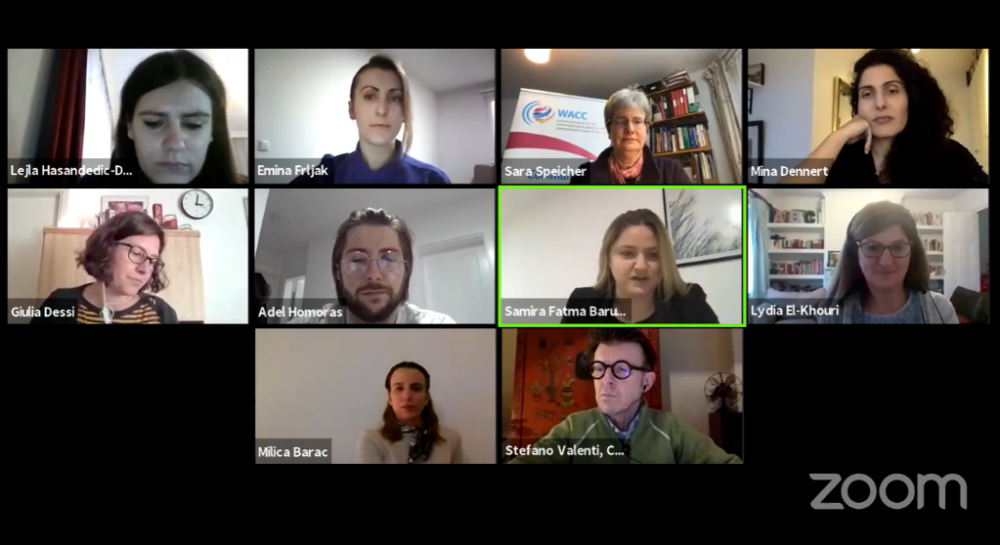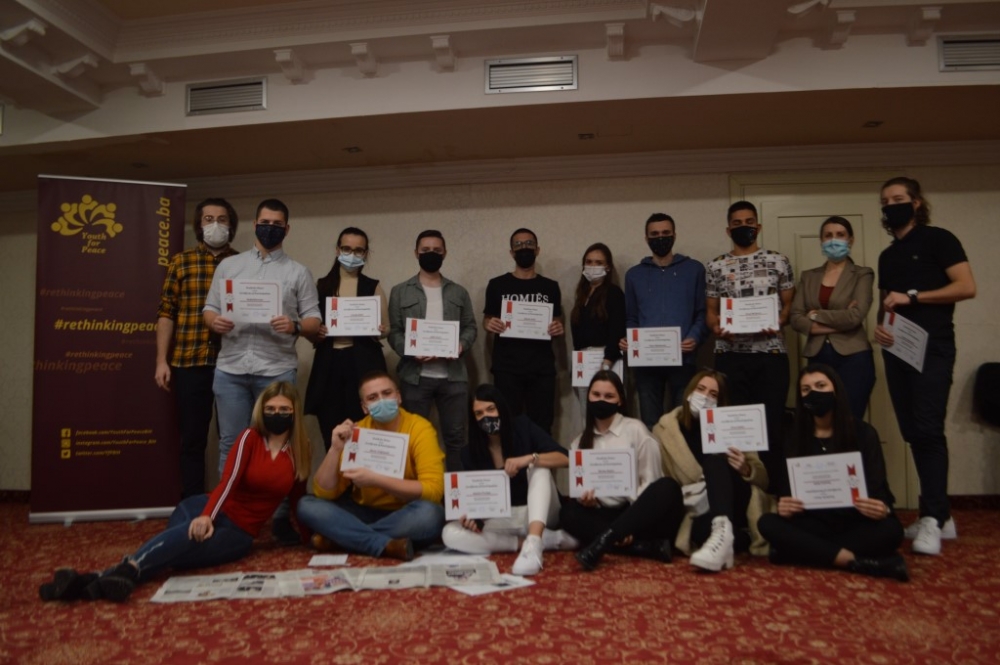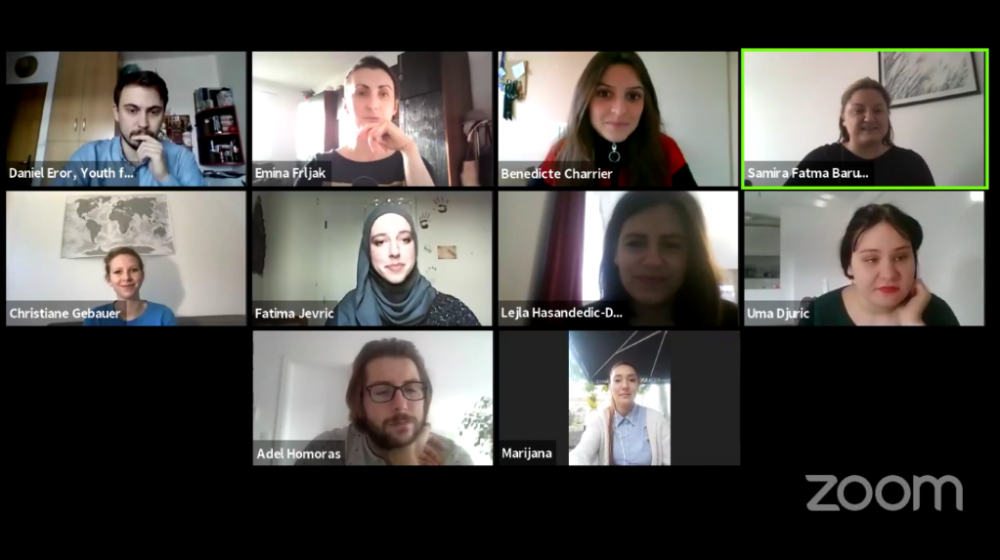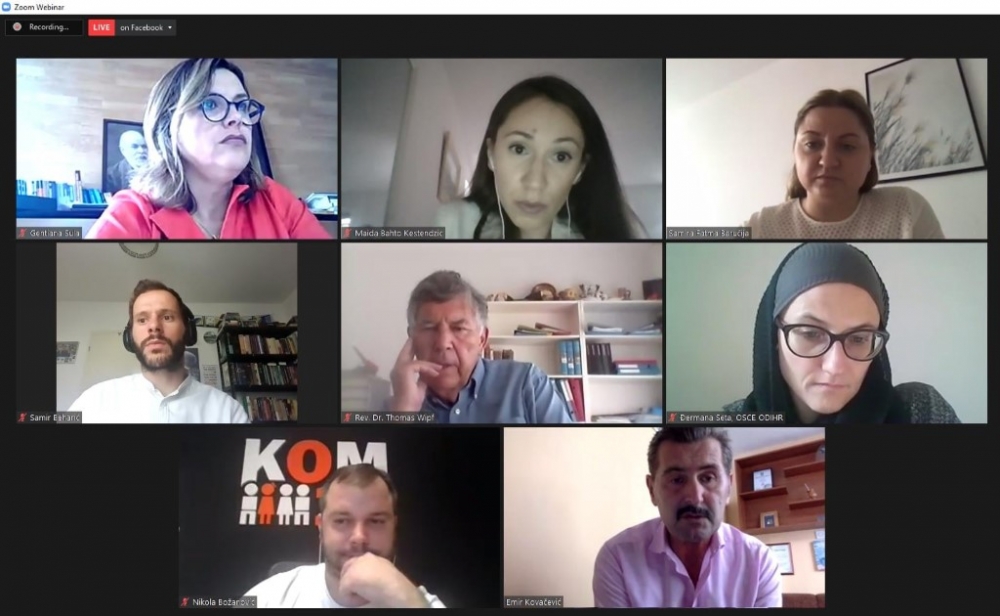 The last panel discussion in 2020 within the #ALTerHate campaign was held on December 21, 2020, via the Zoom platform. This discussion was dedicated to the topic of how to combat hate speech and create an alternative to hateful conduct. The panel discussion was dedicated to discovering different perspectives and ways to approach the fight against hate speech. During the discussion, 5 speakers spoke, representatives of various organizations and initiatives aimed at combating hate speech with a focus on different European countries.
The last panel discussion in 2020 within the #ALTerHate campaign was held on December 21, 2020, via the Zoom platform. This discussion was dedicated to the topic of how to combat hate speech and create an alternative to hateful conduct. The panel discussion was dedicated to discovering different perspectives and ways to approach the fight against hate speech. During the discussion, 5 speakers spoke, representatives of various organizations and initiatives aimed at combating hate speech with a focus on different European countries.
Mina Dennert, a Swedish journalist, spoke about the #Jagarhar (#Iamhere) network that she launched on social media to help those facing hate speech. Today, the network has hundreds of thousands of users from several European countries with the hashtags #Iamhere in several languages and has inspired people around the world to stand up and fight for democratic and inclusive societies.
Lydia El-Khouri, on behalf of the Detect then Act initiative, spoke about raising awareness among people about how language can be used as a tool of hatred, and how to actually recognize this by a combination of linguistic sciences and technology.
Giulia Dessi, journalist and representative of the Get the Trolls Out campaign, presented the work of this campaign and spoke about the fight against religious-based hate speech. Get the Trolls Out is a campaign focused on several European countries and deals with the research and monitoring of religious-based hate speech in public discourse.
Sara Speicher, spoke on behalf of the World Association for Christian Communication (WACC) Europe about their actions aimed at combating hate speech and on this occasion presented the guide "Breaking Down the Social Media Divides: a guide for individuals and communities to address hate online" which was created by WACC to help individuals, but also organizations, to fight hate speech more effectively.
Stefano Valenti, a representative of the Council of Europe, spoke about the Council of Europe's campaigns to combat hate speech and mentioned the famous "No hate speech" movement, but also presented a new campaign against hate speech focused on the Western Balkans "Block the hatred. Share the love “.
After the panelist’s presentations, there was a discussion with the present participants. Panelists were also answering the questions that our followers posted on our Facebook page where they could follow the discussion in the live stream.

After 4 months of an intensive campaign aimed at combating hate speech, a seminar for young people was held in Sarajevo as part of the same project. The seminar was held from 18th to 20th December 2020 at the hotel Hollywood in Ilidža. This seminar brought together 14 young people who were part of the #ALTerHate campaign and young people who are interested in getting involved in the fight against hate speech.
During the 3 days of the seminar, participants discussed what hate speech is, how to recognize it, what are the best ways to fight it and what are the deep-rooted forms of hate speech in our society. In addition to the topic of hate speech, the facilitators talked to the participants about narratives and how they are constructed, but also how to create alternative and counter-narratives to the ubiquitous narratives of hatred and division. Another topic that participants could learn about is media literacy and critical thinking, two extremely important topics connected to recognizing hate speech and the narrative behind this kind of speech as well as how to deconstruct that narrative.
#ALTerHate is a campaign implemented by Youth for Peace, with partner organizations Somborski Edukativni Centar from Serbia and Udhetim i Lire from Albania within the #Speech4Change platform. #Speech4Change is a platform created by young people gathered around the European Interfaith Youth Network of Religions for Peace, which aims to combat hate speech through activities of education, sensitization, and advocacy for acceptance of diversity and inclusion through the creation of alternative narratives.
You can find more about the #ALTerHate campaign on Facebook, Twitter, and Instagram pages through which the campaign is implemented.
Another panel discussion within the #ALTerHate campaign was held on October 28th, 2020 via the Zoom platform. The discussion focused on youth initiatives related to the fight against hate speech, but also the challenges they face in implementing their projects related to this topic. The #ALTerHate team invited speakers from 3 civil society organizations from Europe, more precisely from France, Italy, and Bosnia and Herzegovina. Besides them, one of the panelists was a participant of the #ALTerHate campaign, who, among other things, presented the campaign itself.
Benedicte Charrier, on behalf of Coexister, spoke about the initiatives but also the challenges that this organization faces in its work in the fight against hate speech in France, where the organization is based. Christiane Gebauer from World Student Christian Federation Europe spoke about the work of this organization in the field of combating hate speech at the European level, given that this organization has members and organizes activities throughout Europe. Uma Đurić attended a panel on behalf of the Small Steps, an organization based in Sarajevo, Bosnia and Herzegovina, and spoke about the fight against this phenomenon through the prism of discursive literacy in the context of the Balkans. Fatima Jevrić, the participant of the #ALTerHate campaign, spoke about the challenges of countering hate speech in the context of the reality of Bosnia and Herzegovina, as well as dealing with this phenomenon in the light of the violence and hate burdened past of Bosnia and Herzegovina.
 During the discussion, Christiane Gebauer said that „hate is not rational and one of the things we do, is educating people. But we can't just teach statistics, which would be easy probably, but that doesn't work, because we can't sit in an emotional discussion, which, hate speech always is, we can't sit there and refer to statistics. This works to a certain extent, but not until the very end. So what we also try to do, it put a focus on positive storytelling and on changing the narrative. We believe that this can really make a difference“.
During the discussion, Christiane Gebauer said that „hate is not rational and one of the things we do, is educating people. But we can't just teach statistics, which would be easy probably, but that doesn't work, because we can't sit in an emotional discussion, which, hate speech always is, we can't sit there and refer to statistics. This works to a certain extent, but not until the very end. So what we also try to do, it put a focus on positive storytelling and on changing the narrative. We believe that this can really make a difference“.
Uma Đurić emphasized that „a major challenge in countering hate speech in Western Balkans is the amount of media illiteracy. In order to deal with this challenge, it is important to recognize ideological discourse that from the offline move to the online space. Also, we should create educational models and tools that will help us to recognize hate speech and to deal with it. One of the tools is the program that promotes freedom and critical thinking in order to deal with media illiteracy and tackle hate speech, by providing alternative narratives“.
In her speech, Benedicte Charrier noted the following: „France is facing many issues these days when it comes to hate speech, freedom of speech, freedom of religion, and conviction. Until now the debate has become very binary, so either you're the oppressor, either you're the victim and people are having a hard time understanding that there is also a fair middle that we can all find and that we are all trying to at least make sure that there is the social cohesion that we can reach. It's very hard, but we are trying our best and at the time, as Coexister France we are really trying to take a position as an actor of peace and to give recommendations in terms of peace education and social inclusion because when it comes to hate speech we really believe that before anyone can actually post something or say something that would be super hateful, it's because they have the wrong background and that's where we want to act, we want to act where is the background why people want to act with so much hate“.
Fatima Jevrić, #ALTerHate participant, noted how „the dissolution of Yugoslavia caused intolerance and hatred between different ethnic groups. This war was the main reason for the emergence of hate speech. But, besides the war, there are also plenty of reasons which are managing to sustain hate speech today. One of the biggest reasons for sustaining hate speech today in BiH, Serbia, and Albania are in fact political elites“.
The presentation of the panelists was followed by a question session and an interesting discussion between the panelists and the participants.
The International Day of Peace has been celebrated on September 21st since 1981 when it was established at the General Assembly of the United Nations. The theme of this year's Peace Day was "Shaping Peace Together". Youth for Peace team saw this day as a great opportunity to launch the #ALTerHate campaign, which will focus on combating hate speech. This is a topic that is inexhaustible, and especially current in the time in which we live, given the widespread use of social networks, but also global events that, unfortunately, are increasingly encouraging the emergence of hate speech across our planet. On the occasion of the International Day of Peace, a webinar on the topic "Towards Positive Peace: Countering Hate Speech" was organized, where this topic was approached from different angles, given that hate speech is a multidimensional problem. During the webinar 7 speakers coming from different sectors such as media, legal sector, non-governmental and governmental sector, and religious communities were speaking.
Some of the questions answered by the speakers during the webinar were: How can the legal system respond to hate speech? How to help the most vulnerable groups in our society? What are the good practices of combating hate speech in Europe? How can young people create an alternative to hate speech?

During the webinar, Emir Kovačević, a legal expert on freedom of religion and belief, spoke about the importance of combating hate speech through legal mechanisms, as well as the importance and connection of the state and the legal system with civil society in the fight against hate speech.
Maida Bahto Kestendžić, on behalf of the Press Council of Bosnia and Herzegovina, pointed out that hate speech is not freedom of expression, but a criminal offense prohibited by our criminal law and stressed that hate speech in the media should be reported to the Press Council with an appropriate explanation about its contents and occasion where it emerged.
Rev. Dr. Thomas Wipf (ECRL / Religions for Peace), reminded that hate speech is a multidimensional problem, therefore raising awareness of issues related to hate speech is a very important segment, and that hate speech in various forms is not a problem of others, but that we must all look in the mirror and look at ourselves, our group, our tradition, the religion we belong to and our own prejudices.
Đermana Šeta (OSCE / ODIHR), warned of a high level of racism, anti-Semitism, hatred against Muslims, the LGBTQI population, and the Roma, and that all cases of hate speech were mainly related to intolerant political discourse. She also added that intolerance does not appear all at once but is related to the dominant narratives present in a particular country that are used for certain political or economic interests.
Gentiana Sula (The Authority for Information on Former State Security Documents, Albania) stressed that propaganda is a powerful tool for hate speech. She mentioned the example of Albania during communism and pointed out that censorship on the one hand and the complete isolation of the country on the other, supported by a very well-organized system, led to the complete demonization of "others" and the emergence of hate speech.
Nikola Božanović from Serbia, on behalf of the "Hate Fighters Network", spoke about raising awareness about the negative things that are published online, but also about the fight against hate speech offline. He stressed that young people should be given the opportunity to express themselves and make a selfless contribution in the fight against hate speech. Finally, he emphasized that this phenomenon is a problem in the solution of which the whole society should participate.
Samir Beharić, on behalf of the "PRVI" initiative, pointed out that all political structures that use and abuse hate speech should not get our votes in the elections and highlighted the excellent thought of an American professor who said that "political elites in the Balkans are so-called peace cartels, which threaten people by using hate speech and war rhetoric to stay in power, ” and that the best punishment for them would therefore be to use our voting right during elections and not vote for them.
 The last panel discussion in 2020 within the #ALTerHate campaign was held on December 21, 2020, via the Zoom platform. This discussion was dedicated to the topic of how to combat hate speech and create an alternative to hateful conduct. The panel discussion was dedicated to discovering different perspectives and ways to approach the fight against hate speech. During the discussion, 5 speakers spoke, representatives of various organizations and initiatives aimed at combating hate speech with a focus on different European countries.
The last panel discussion in 2020 within the #ALTerHate campaign was held on December 21, 2020, via the Zoom platform. This discussion was dedicated to the topic of how to combat hate speech and create an alternative to hateful conduct. The panel discussion was dedicated to discovering different perspectives and ways to approach the fight against hate speech. During the discussion, 5 speakers spoke, representatives of various organizations and initiatives aimed at combating hate speech with a focus on different European countries.





